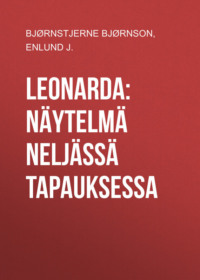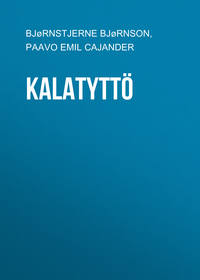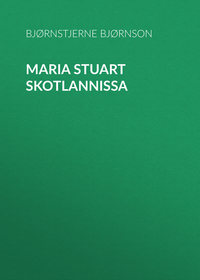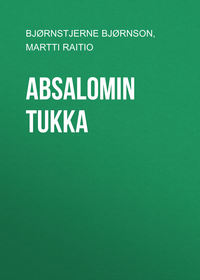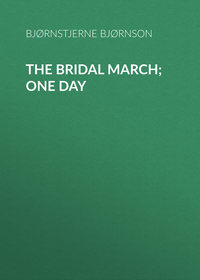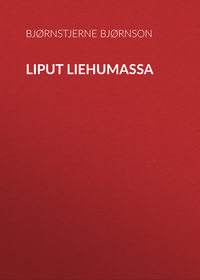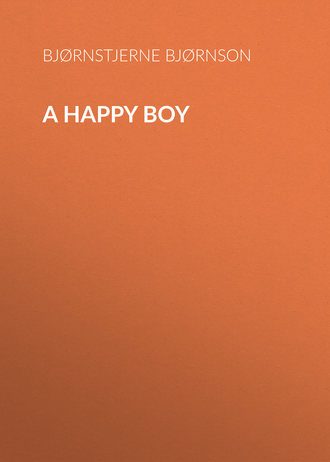 полная версия
полная версияA Happy Boy
"He took the sacrament to-day," said she; "he surely thought of you."
"No; he did not think of me," said Anders. "I know him; he thinks only of himself."
For a long time there was silence; the sweat poured from Baard as he stood there, although it was a cold evening. The wife inside was busied with a kettle that crackled and hissed on the hearth; a little infant cried now and then, and Anders rocked it. At last the wife spoke these few words:—
"I believe you both think of each other without being willing to admit it."
"Let us talk of something else," replied Anders.
After a while he got up and moved towards the door. Baard was forced to hide in the wood-shed; but to that very place Anders came to get an armful of wood. Baard stood in the corner and saw him distinctly; he had put off his threadbare Sunday clothes and wore the uniform he had brought home with him from the war, the match to Baard's, and which he had promised his brother never to touch but to leave for an heirloom, Baard having given him a similar promise. Anders' uniform was now patched and worn; his strong, well-built frame was encased, as it were, in a bundle of rags; and, at the same time, Baard heard the gold watch ticking in his own pocket. Anders walked to where the fagots lay; instead of stooping at once to pick them up, he paused, leaned back against the wood-pile and gazed up at the sky, which glittered brightly with stars. Then he drew a sigh and muttered,—
"Yes—yes—yes;—O Lord! O Lord!"
As long as Baard lived he heard these words. He wanted to step forward, but just then his brother coughed, and it seemed so difficult, more was not required to hold him back. Anders took up his armful of wood, and brushed past Baard, coming so close to him that the twigs struck his face, making it smart.
For fully ten minutes he stood as if riveted to the spot, and it is doubtful when he would have left, had he not, after his great emotion, been seized with a shivering fit that shook him through and through. Then he moved away; he frankly confessed to himself that he was too cowardly to go in, and so he now formed a new plan. From an ash-box which stood in the corner he had just left, he took some bits of charcoal, found a resinous pine-splint, went up to the barn, closed the door and struck a light. When he had lit the pine-splint, he held it up to find the wooden peg where Anders hung his lantern when he came early in the morning to thresh. Baard took his gold watch and hung it on the peg, blew out his light and left; and then he felt so relieved that he bounded over the snow like a young boy.
The next day he heard that the barn had burned to the ground during the night. No doubt sparks had fallen from the torch that had lit him while he was hanging up his watch.
This so overwhelmed him that he kept his room all day like a sick man, brought out his hymn-book, and sang until the people in the house thought he had gone mad. But in the evening he went out; it was bright moonlight. He walked to his brother's place, dug in the ground where the fire had been, and found, as he had expected, a little melted lump of gold. It was the watch.
It was with this in his tightly closed hand that he went in to his brother, imploring peace, and was about to explain everything.
A little girl had seen him digging in the ashes, some boys on their way to a dance had noticed him going down toward the place the preceding Sunday evening; the people in the house where he lived testified how curiously he had acted on Monday, and as every one knew that he and his brother were bitter enemies, information was given and a suit instituted.
No one could prove anything against Baard, but suspicion rested on him.
Less than ever, now, did he feel able to approach his brother.
Anders had thought of Baard when the barn was burned, but had spoken of it to no one. When he saw him enter his room, the following evening, pale and excited, he immediately thought: "Now he is smitten with remorse, but for such a terrible crime against his brother he shall have no forgiveness." Afterwards he heard how people had seen Baard go down to the barn the evening of the fire, and, although nothing was brought to light at the trial, Anders firmly believed his brother to be guilty.
They met at the trial; Baard in his good clothes, Anders in his patched ones. Baard looked at his brother as he entered, and his eyes wore so piteous an expression of entreaty that Anders felt it in the inmost depths of his heart. "He does not want me to say anything," thought Anders, and when he was asked if he suspected his brother of the deed, he said loudly and decidedly, "No!"
Anders took to hard drinking from that day, and was soon far on the road to ruin. Still worse was it with Baard; although he did not drink, he was scarcely to be recognized by those who had known him before.
Late one evening a poor woman entered the little room Baard rented, and begged him to accompany her a short distance. He knew her: it was his brother's wife. Baard understood forthwith what her errand was; he grew deathly pale, dressed himself, and went with her without a word. There was a glimmer of light from Anders' window, it twinkled and disappeared, and they were guided by this light, for there was no path across the snow. When Baard stood once more in the passage, a strange odor met him which made him feel ill. They entered. A little child stood by the fireplace eating charcoal; its whole face was black, but as it looked up and laughed it displayed white teeth,—it was the brother's child.
There on the bed, with a heap of clothes thrown over him, lay Anders, emaciated, with smooth, high forehead, and with his hollow eyes fixed on his brother. Baard's knees trembled; he sat down at the foot of the bed and burst into a violent fit of weeping. The sick man looked at him intently and said nothing. At length he asked his wife to go out, but Baard made a sign to her to remain; and now these two brothers began to talk together. They accounted for everything from the day they had bid for the watch up to the present moment. Baard concluded by producing the lump of gold he always carried about him, and it now became manifest to the brothers that in all these years neither had known a happy day.
Anders did not say much, for he was not able to do so, but Baard watched by his bed as long as he was ill.
"Now I am perfectly well," said Anders one morning on waking. "Now, my brother, we will live long together, and never leave each other, just as in the old days."
But that day he died.
Baard took charge of the wife and the child, and they fared well from that time. What the brothers had talked of together by the bed, burst through the walls and the night, and was soon known to all the people in the parish, and Baard became the most respected man among them. He was honored as one who had known great sorrow and found happiness again, or as one who had been absent for a very long time. Baard grew inwardly strong through all this friendliness about him; he became a truly pious man, and wanted to be useful, he said, and so the old corporal took to teaching school. What he impressed upon the children, first and last, was love, and he practiced it himself, so that the children clung to him as to a playmate and father in one.
Such was the history of the school-master, and so deeply did it root itself in Oyvind's mind that it became both religion and education for him. The school-master grew to be almost a supernatural being in his eyes, although he sat there so sociably, grumbling at the scholars. Not to know every lesson for him was impossible, and if Oyvind got a smile or a pat on his head after he had recited, he felt warm and happy for a whole day.
It always made the deepest impression on the children when the old school-master sometimes before singing made a little speech to them, and at least once a week read aloud some verses about loving one's neighbor. When he read the first of those verses, his voice always trembled, although he had been reading it now some twenty or thirty years. It ran thus:—
"Love thy neighbor with Christian zeal! Crush him not with an iron heel, Though he in dust be prostrated! Love's all powerful, quickening hand Guides, forever, with magic wand All that it has created."But when he had recited the whole poem and had paused a little, he would cry, and his eyes would twinkle,—
"Up, small trolls! and go nicely home without any noise,—go quietly, that I may only hear good of you, little toddlers!"
But when they were making the most noise in hunting up their books and dinner-pails, he shouted above it all,—
"Come again to-morrow, as soon as it is light, or I will give you a thrashing. Come again in good season, little girls and boys, and then we will be industrious."
CHAPTER IV
Of Oyvind's further progress until a year before confirmation there is not much to report. He studied in the morning, worked through the day, and played in the evening.
As he had an unusually sprightly disposition, it was not long before the neighboring children fell into the habit of resorting in their playtime to where he was to be found. A large hill sloped down to the bay in front of the place, bordered by the cliff on one side and the wood on the other, as before described; and all winter long, on pleasant evenings and on Sundays, this served as coasting-ground for the parish young folks. Oyvind was master of the hill, and he owned two sleds, "Fleet-foot" and "Idler;" the latter he loaned out to larger parties, the former he managed himself, holding Marit on his lap.
The first thing Oyvind did in those days on awaking, was to look out and see whether it was thawing, and if it was gray and lowering over the bushes beyond the bay, or if he heard a dripping from the roof, he was long about dressing, as though there were nothing to be accomplished that day. But if he awoke, especially on a Sunday, to crisp, frosty, clear weather, to his best clothes and no work, only catechism or church in the morning, with the whole afternoon and evening free—heigh! then the boy made one spring out of bed, donned his clothes in a hurry as if for a fire, and could scarcely eat a mouthful. As soon as afternoon had come, and the first boy on skees drew in sight along the road-side, swinging his guide-pole above his head and shouting so that echoes resounded through the mountain-ridges about the lake; and then another on the road on a sled, and still another and another,—off started Oyvind with "Fleet-foot," bounded down the hill, and stopped among the last-comers, with a long, ringing shout that pealed from ridge to ridge all along the bay, and died away in the far distance.
Then he would look round for Marit, but when she had come he payed no further attention to her.
At last there came a Christmas, when Oyvind and Marit might be about sixteen or seventeen, and were both to be confirmed in the spring. The fourth day after Christmas there was a party at the upper Heidegards, at Marit's grandparents', by whom she had been brought up, and who had been promising her this party for three years, and now at last had to give it during the holidays. Oyvind was invited to it.
It was a somewhat cloudy evening but not cold; no stars could be seen; the next day must surely bring rain. There blew a sleepy wind over the snow, which was swept away here and there on the white Heidefields; elsewhere it had drifted. Along the part of the road where there was but little snow, were smooth sheets of ice of a blue-black hue, lying between the snow and the bare field, and glittering in patches as far as the eye could reach. Along the mountain-sides there had been avalanches; it was dark and bare in their track, but on either side light and snow-clad, except where the forest birch-trees put their heads together and made dark shadows. No water was visible, but half-naked heaths and bogs lay under the deeply-fissured, melancholy mountains. Gards were spread in thick clusters in the centre of the plain; in the gloom of the winter evening they resembled black clumps, from which light shot out over the fields, now from one window, now from another; from these lights it might be judged that those within were busy.
Young people, grown-up and half-grown-up, were flocking together from diverse directions; only a few of them came by the road, the others had left it at least when they approached the gards, and stole onward, one behind the stable, a couple near the store-house, some stayed for a long time behind the barn, screaming like foxes, others answered from afar like cats; one stood behind the smoke-house, barking like a cross old dog whose upper notes were cracked; and at last all joined in a general chase. The girls came sauntering along in large groups, having a few boys, mostly small ones, with them, who had gathered about them on the road in order to appear like young men. When such a bevy of girls arrived at the gard and one or two of the grown youths saw them, the girls parted, flew into the passages or down in the garden, and had to be dragged thence into the house, one by one. Some were so excessively bashful that Marit had to be sent for, and then she came out and insisted upon their entering. Sometimes, too, there appeared one who had had no invitation and who had by no means intended to go in, coming only to look on, until perhaps she might have a chance just to take one single dance. Those whom Marit liked well she invited into a small chamber, where her grandfather sat smoking his pipe, and her grandmother was walking about. The old people offered them something to drink and spoke kindly to them. Oyvind was not among those invited in, and this seemed to him rather strange.
The best fiddler of the parish could not come until later, so meanwhile they had to content themselves with the old one, a houseman, who went by the name of Gray-Knut. He knew four dances; as follows: two spring dances, a halling, and an old dance, called the Napoleon waltz; but gradually he had been compelled to transform the halling into a schottishe by altering the accent, and in the same manner a spring dance had to become a polka-mazurka. He now struck up and the dancing began. Oyvind did not dare join in at once, for there were too many grown folks here; but the half-grown-up ones soon united, thrust one another forward, drank a little strong ale to strengthen their courage, and then Oyvind came forward with them. The room grew warm to them; merriment and ale mounted to their heads. Marit was on the floor most of the time that evening, no doubt because the party was at her grandparents'; and this led Oyvind to look frequently at her; but she was always dancing with others. He longed to dance with her himself, and so he sat through one dance, in order to be able to hasten to her side the moment it was ended; and he did so, but a tall, swarthy fellow, with thick hair, threw himself in his way.
"Back, youngster!" he shouted, and gave Oyvind a push that nearly made him fall backwards over Marit.
Never before had such a thing occurred to Oyvind; never had any one been otherwise than kind to him; never had he been called "youngster" when he wanted to take part; he blushed crimson, but said nothing, and drew back to the place where the new fiddler, who had just arrived, had taken his seat and was tuning his instrument. There was silence in the crowd, every one was waiting to hear the first vigorous tones from "the chief fiddler." He tried his instrument and kept on tuning; this lasted a long time; but finally he began with a spring dance, the boys shouted and leaped, couple after couple coming into the circle. Oyvind watched Marit dancing with the thick-haired man; she laughed over the man's shoulder and her white teeth glistened. Oyvind felt a strange, sharp pain in his heart for the first time in his life.
He looked longer and longer at her, but however it might be, it seemed to him that Marit was now a young maiden. "It cannot be so, though," thought he, "for she still takes part with the rest of us in our coasting." But grown-up she was, nevertheless, and after the dance was ended, the dark-haired man pulled her down on his lap; she tore herself away, but still she sat down beside him.
Oyvind's eyes turned to the man, who wore a fine blue broadcloth suit, blue checked shirt, and a soft silk neckerchief; he had a small face, vigorous blue eyes, a laughing, defiant mouth. He was handsome. Oyvind looked more and more intently, finally scanned himself also; he had had new trousers for Christmas, which he had taken much delight in, but now he saw that they were only gray wadmal; his jacket was of the same material, but old and dark; his vest, of checked homespun, was also old, and had two bright buttons and a black one. He glanced around him and it seemed to him that very few were so poorly clad as he. Marit wore a black, close-fitting dress of a fine material, a silver brooch in her neckerchief and had a folded silk handkerchief in her hand. On the back of her head was perched a little black silk cap, which was tied under the chin with a broad, striped silk ribbon. She was fair and had rosy cheeks, and she was laughing; the man was talking to her and was laughing too. The fiddler started another tune, and the dancing was about to begin again. A comrade came and sat down beside Oyvind.
"Why are you not dancing, Oyvind? " he asked pleasantly.
"Dear me!" said Oyvind, "I do not look fit."
"Do not look fit?" cried his comrade; but before he could say more, Oyvind inquired,—
"Who is that in the blue broadcloth suit, dancing with Marit?"
"That is Jon Hatlen, he who has been away so long at an agricultural school and is now to take the gard."
At that moment Marit and Jon sat down.
"Who is that boy with light hair sitting yonder by the fiddler, staring at me?" asked Jon.
Then Marit laughed and said,—
"He is the son of the houseman at Pladsen."
Oyvind had always known that he was a houseman's son; but until now he had never realized it. It made him feel so very little, smaller than all the rest; in order to keep up he had to try and think of all that hitherto had made him happy and proud, from the coasting hill to each kind word. He thought, too, of his mother and his father, who were now sitting at home and thinking that he was having a good time, and he could scarcely hold back his tears. Around him all were laughing and joking, the fiddle rang right into his ear, it was a moment in which something black seemed to rise up before him, but then he remembered the school with all his companions, and the school-master who patted him, and the priest who at the last examination had given him a book and told him he was a clever boy. His father himself had sat by listening and had smiled on him.
"Be good now, dear Oyvind," he thought he heard the school-master say, taking him on his lap, as when he was a child. "Dear me! it all matters so little, and in fact all people are kind; it merely seems as if they were not. We two will be clever, Oyvind, just as clever as Jon Hatlen; we shall yet have good clothes, and dance with Marit in a light room, with a hundred people in it; we will smile and talk together; there will be a bride and bridegroom, a priest, and I will be in the choir smiling upon you, and mother will be at home, and there will be a large gard with twenty cows, three horses, and Marit as good and kind as at school."
The dancing ceased. Oyvind saw Marit on the bench in front of him, and Jon by her side with his face close up to hers; again there came that great burning pain in his breast, and he seemed to be saying to himself: "It is true, I am suffering."
Just then Marit rose, and she came straight to him. She stooped over him.
"You must not sit there staring so fixedly at me," said she; "you might know that people are noticing it. Take some one now and join the dancers."
He made no reply, but he could not keep back the tears that welled up to his eyes as he looked at her. Marit had already risen to go when she saw this, and paused; suddenly she grew as red as fire, turned and went back to her place, but having arrived there she turned again and took another seat. Jon followed her forthwith.
Oyvind got up from the bench, passed through the crowd, out in the grounds, sat down on a porch, and then, not knowing what he wanted there rose, but sat down again, thinking he might just as well sit there as anywhere else. He did not care about going home, nor did he desire to go in again, it was all one to him. He was not capable of considering what had happened; he did not want to think of it; neither did he wish to think of the future, for there was nothing to which he looked forward.
"But what, then, is it I am thinking of?" he queried, half aloud, and when he had heard his own voice, he thought: "You can still speak, can you laugh?" And then he tried it; yes, he could laugh, and so he laughed loud, still louder, and then it occurred to him that it was very amusing to be sitting laughing here all by himself, and he laughed again. But Hans, the comrade who had been sitting beside him, came out after him.
"Good gracious, what are you laughing at?" he asked, pausing in front of the porch. At this Oyvind was silent.
Hans remained standing, as if waiting to see what further might happen.
Oyvind got up, looked cautiously about him and said in a low tone,—
"Now Hans, I will tell you why I have been so happy before: it was because I did not really love any one; from the day we love some one, we cease to be happy," and he burst into tears.
"Oyvind!" a voice whispered out in the court; "Oyvind!" He paused and listened. "Oyvind," was repeated once more, a little louder. "It must be she," he thought.
"Yes," he answered, also in a whisper; and hastily wiping his eyes he came forward.
A woman stole softly across the gard.
[Transcriber's Note: The above sentence should read, "A woman stole softly across the yard." In other early translations, the words "yard" and "court-yard" are used here. "Gard" in this case is apparently a typo. The use of the word, "gard" throughout the rest of this story refers to "farm."]
"Are you there?" she asked.
"Yes," he answered, standing still.
"Who is with you?"
"Hans."
But Hans wanted to go.
"No, no!" besought Oyvind.
She slowly drew near them, and it was Marit.
"You left so soon," said she to Oyvind.
He knew not what to reply; thereupon Marit, too, became embarrassed, and all three were silent. But Hans gradually managed to steal away. The two remained behind, neither looking at each other, nor stirring. Finally Marit whispered:—
"I have been keeping some Christmas goodies in my pocket for you, Oyvind, the whole evening, but I have had no chance to give them to you before."
She drew forth some apples, a slice of a cake from town, and a little half pint bottle, which she thrust into his hand, and said he might keep. Oyvind took them.
"Thank you!" said he, holding out his hand; hers was warm, and he dropped it at once as if it had burned him.
"You have danced a good deal this evening," he murmured.
"Yes, I have," she replied, "but you have not danced much," she added.
"I have not," he rejoined.
"Why did you not dance?"
"Oh"—
"Oyvind!"
"Yes."
"Why did you sit looking at me so?"
"Oh—Marit!"
"What!"
"Why did you dislike having me look at you?"
"There were so many people."
"You danced a great deal with Jon Hatlen this evening."
"I did."
"He dances well."
"Do you think so?"
"Oh, yes. I do not know how it is, but this evening I could not bear to have you dance with him, Marit."
He turned away,—it had cost him something to say this.
"I do not understand you, Oyvind."
"Nor do I understand myself; it is very stupid of me. Good-by, Marit;
I will go now."
He made a step forward without looking round. Then she called after him.
"You make a mistake about what you saw."
He stopped.
"That you have already become a maiden is no mistake."
He did not say what she had expected, therefore she was silent; but at that moment she saw the light from a pipe right in front of her. It was her grandfather, who had just turned the corner and was coming that way. He stood still.
"Is it here you are, Marit?"
"Yes."
"With whom are you talking?"
"With Oyvind."


